Hertz Global Holdings
BUSINESS
Hertz Holdings (HTZ) was incorporated in Delaware in 2015 to serve as the top-level holding company for Rental Car Intermediate Holdings, LLC, which wholly owns Hertz, Hertz Global's primary operating company. Hertz was incorporated in Delaware in 1967 and is a successor to corporations that have been engaged in the vehicle rental and leasing business since 1918.1
The company operate its vehicle rental business globally through the Hertz, Dollar and Thrifty brands from approximately 10,200 corporate and franchisee locations in North America, Europe, Latin America, Africa, Asia, Australia, The Caribbean, the Middle East and New Zealand. Hertz Global Holdings is one of the largest worldwide airport general use vehicle rental companies and its Hertz brand name is one of the most recognized in the world, signifying leadership in quality rental services and products. Hertz Global Holdings has an extensive network of rental locations in the U.S. and in all major European markets. The company believe that the company maintain one of the leading airport vehicle rental brand market shares, by overall reported revenues, in the U.S. and at major airports in Europe where data regarding vehicle rental concessionaire activity is available. Hertz Global Holdings is a leading provider of comprehensive, integrated vehicle leasing and fleet management solutions through its Donlen subsidiary.
BUSINESS SEGMENTS
Hertz Global Holdings has identified three reportable segments, which are organized based on the products and services provided by its operating segments and the geographic areas in which its operating segments conduct business, as follows:
- U.S. RAC - Rental of vehicles, as well as sales of value-added products and services, in the U.S. The company maintain a substantial network of company-operated car rental locations in the U.S., enabling it to provide consistent quality and service. The company also have franchisees and partners that operate rental locations under its brands throughout the U.S;
- International RAC - Rental and leasing of vehicles, as well as sales of value-added products and services, internationally. The company maintain a substantial network of company-operated car rental locations internationally, a majority of which are in Europe. The company's franchisees and partners also operate rental locations in approximately 150 countries and jurisdictions, including many of the countries in which the company also have company-operated rental locations; and
- All Other Operations - Comprised of its Donlen business, which provides vehicle leasing and fleet management services, and other business activities in the U.S. and Canada. Donlen is a leading provider of vehicle leasing and fleet management services for corporate fleets. Donlen's fleet management programs provide outsourcing solutions to reduce fleet operating costs and improve driver productivity. These programs include administration of preventive maintenance, advisory services, and fuel and accident management along with other complementary services. Additionally, Donlen provides specialized consulting and technology expertise that allows it and its customers to model, measure and manage fleet performance more effectively and efficiently.
In addition to the above reportable segments, Hertz Global Holdings has Corporate operations. The company assess performance and allocate resources based upon the financial information for its operating segments.
Set forth below are charts showing revenues and revenue earning vehicles by reportable segment and geographic area:
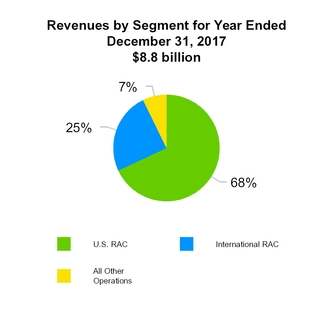
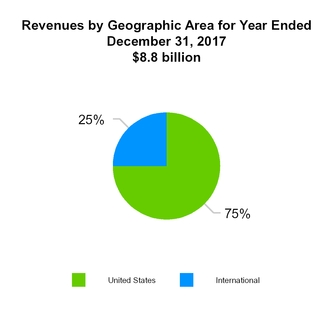
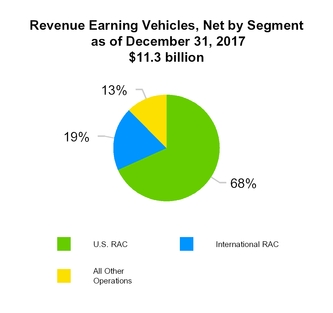
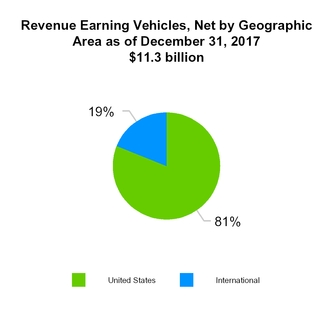
U.S. and International Rental Car Segments
The company's U.S. and International RAC segments generated $6.0 billion and $2.2 billion, respectively, in revenues during the year ended December 31, 2017.
Markets and Competition
Competition among vehicle rental industry participants is intense and is primarily based on price, vehicle availability and quality, service, reliability, rental locations, product innovation, competition from online travel agents and vehicle rental brokers. The company believe that the prominence and service reputation of the Hertz, Dollar and Thrifty brands, its extensive worldwide ownership of vehicle rental operations and its commitment to innovation and service provide it with a strong competitive foundation.
U.S.
The U.S. represents approximately $29 billion in estimated annual industry revenues for 2017. The average number of vehicles in the U.S. vehicle rental industry decreased 5% in 2017 to about 2.2 million vehicles. U.S. industry revenue per unit per month was approximately $1,091 which was an improvement of 6.5% over 2016. Rentals by airline travelers at or near airports (‘‘airport rentals’’) are influenced by developments in the travel industry and particularly in airline passenger traffic (‘‘enplanements’’) as well as the Gross Domestic Product (‘‘GDP’’). Off airport rental volume is primarily driven by local business use, such as vehicle repair shops, leisure travel and insurance replacements.
The company's principal vehicle rental industry competitors in the U.S. are Avis Budget Group, Inc. (“ABG”) which currently operates the Avis, Budget, ZipCar and Payless brands and Enterprise Holdings, which operates the Enterprise Rent-A-Car Company ("Enterprise"), National Car Rental and Alamo Rent A Car brands. There are also local and regional vehicle rental companies, and transportation network companies which provide ride-hailing services that have some overlap in customer use cases, which are largely used for short length trips in urban areas.
Europe
Europe represents approximately $16 billion in annual industry revenues. Europe has generally demonstrated a lower historical reliance on air travel. The European off airport vehicle rental market has been significantly more developed than it is in the U.S. Within Europe, the largest markets in which the company do business are France, Germany, Italy, Spain, and the United Kingdom. Throughout Europe, the company do business through company-operated rental locations as well as through its partners or franchisees to whom Hertz Global Holdings has licensed use of its brands.
The company's principal pan-European competitors in the vehicle rental industry are Europcar, Enterprise Holdings, operating the Enterprise, National, Alamo brands and the Dooley, Citer and Atesa brands in Ireland, France and Spain, respectively, ABG operating the Avis, Budget, Payless and Zipcar brands and the Maggiore brand in Italy. In certain European countries, there are also other companies, and brands with substantial market shares, including Sixt SE, operating the Sixt brand in Austria, Belgium, France, Germany, Italy, Luxembourg, the Netherlands, Spain, Switzerland and the United Kingdom.
Asia Pacific
Asia Pacific, including Australia and New Zealand, represents approximately $13 billion in annual industry revenues. Within this region, the largest markets in which the company do business are Australia, China, Japan and South Korea. In each of these markets Hertz Global Holdings has company-operated rental locations or do business through its partners or franchisees to whom Hertz Global Holdings has licensed use of its brands.
The company's principal vehicle rental industry competitors in the Asia Pacific market place are ABG, operating the Avis, Budget, Apex and Zipcar brands, Europcar, and Enterprise Holdings, operating the Enterprise, National and Alamo brands and the Redspot brand in Australia and New Zealand.
Middle East and Africa
The Middle East and Africa represent approximately $3 billion in annual industry revenues. Within these regions, the largest markets in which the company do business are Saudi Arabia, South Africa and the United Arab Emirates. In each of these markets the company do business through its franchisees to whom Hertz Global Holdings has licensed use of its brands.
The company's principal vehicle rental industry competitors in the Middle East market are ABG, operating the Avis, Budget, Payless and Zipcar brands, Europcar, Enterprise Holdings, operating the Enterprise, National and Alamo brands, and Sixt SE, operating the Sixt brand.
Latin America
The Latin America markets represent approximately $3 billion in annual industry revenues. Within Latin America the largest markets in which the company do business are Argentina, Brazil, Chile and Mexico. In each of these markets its Hertz, Dollar and Thrifty brands are present through its partners or franchisees to whom Hertz Global Holdings has licensed use of the respective brand.
In Latin America, the principal vehicle rental industry competitors are ABG, operating the Avis, Budget and Payless brands, and Enterprise Holdings, which operates the Enterprise, National and Alamo brands. Other key players in the region are Localiza, JSL, operating the Movida brand, and Soluçônes Automôvel Globais, operating the Unidas brand.
In 2017, the company completed the sale of its Brazil Operations to Localiza. As part of the sale, both companies entered into referral and brand cooperation agreements to govern their ongoing relationship which have an initial term of twenty years with an option to extend for another twenty years. The alliance also involves the exchange of knowledge in areas of technology, customer service and operational excellence.
Brands
The company's U.S. and International vehicle rental businesses are primarily operated through three brands - Hertz, Dollar, and Thrifty. The company offer multiple brands in order to provide customers a full range of rental services at different price points, levels of service, offerings and products. Each of its brands generally maintains separate airport counters, reservations, marketing and other customer contact activities. The company achieve synergies across its brands by utilizing a single fleet and fleet management team and combined maintenance, cleaning and back office functions, where applicable.
The company's top tier brand, Hertz, is one of the most recognized brands in the world, offering premium services that redefined the industry. This is consistent with numerous published best-in-class vehicle rental awards that Hertz Global Holdings has won, both in the U.S. and internationally, over many years. The company go to market under the tagline of “Hertz. We’re here to get you there” which is true to its promise and reputation for quality and customer service. Hertz Global Holdings has a number of innovative offerings, such as Hertz Gold Plus Rewards; Hertz Ultimate Choice; its national-scale luxury rental program (“Prestige Collection”); its sports vehicle rental program (“Adrenaline Collection”); its environmentally friendly rental program (“Green Traveler Collection”); and, its elite sports and luxury vehicle rental program (“Dream Cars”). The company continue to maintain its position as a premier provider of vehicle rental services through an intense focus on service, loyalty, quality and product innovation.
The company's smart value brand, Dollar, is the choice for financially-focused travelers looking for a dependable car at a price they can afford. The Dollar brand’s main focus is serving the airport vehicle rental market, comprised of family, leisure and small business travelers. Dollar’s tagline of “The company never forget whose dollar it is” indicates the brand’s mission to provide a reliable rental experience at a price that works. Dollar operates primarily through company-owned locations in the U.S. and Canada. The company also globally license to independent franchisees which operate as a part of the Dollar brand system and have company-owned Dollar locations in certain countries.
The company's deep value brand, Thrifty, is the brand for savvy travelers who enjoy the “thrill of the hunt” to find a good deal. The Thrifty brand’s main focus is serving the airport vehicle rental market, comprised of leisure travelers. Thrifty’s tagline “Thrift Now, Splurge Later” indicates the brand’s focus on being the rental company that puts you in control of where you splurge and where you save. Thrifty operates primarily through company-owned locations in the U.S. and Canada.
The company also globally license to independent franchisees which operate as part of the Thrifty brand system and have company-owned Thrifty locations in certain countries.
Internationally, the company also offer its Firefly brand which is a deep value brand for price conscious leisure travelers. Hertz Global Holdings has Firefly locations servicing local area airports in select international leisure markets where other deep value brands have a significant presence.
Operations
Locations
The company operate both airport and off airport locations which utilize common vehicle fleets, are supervised by common country, regional and local area management, use many common systems and rely on common maintenance and administrative centers. Additionally, its airport and off airport locations utilize common marketing activities and have many of the same customers. The company regard both types of locations as aspects of a single, unitary, vehicle rental business. Off airport revenues comprised approximately 33% of its worldwide rental vehicle revenues in 2017 and approximately 32% in 2016.
Airport
Hertz Global Holdings has approximately 1,600 airport rental locations in the U.S. and approximately 1,500 airport rental locations internationally. The company's international vehicle rental operations have company-operated locations in Australia, Belgium, Canada, the Czech Republic, France, Germany, Italy, Luxembourg, the Netherlands, New Zealand, Puerto Rico, Slovakia, Spain, the United Kingdom and the U.S. Virgin Islands. The company believe that its extensive U.S. and international network of company-operated locations contributes to the consistency of its service, cost control, vehicle utilization, yield management, competitive pricing and its ability to offer one-way rentals.
For its airport company-operated rental locations, Hertz Global Holdings has obtained concessions or similar leasing agreements or arrangements, granting it the right to conduct a vehicle rental business at the respective airport. The company's concessions were obtained from the airports' operators, which are typically governmental bodies or authorities, following either negotiation or bidding for the right to operate a vehicle rental business. The terms of an airport concession typically require it to pay the airport's operator concession fees based upon a specified percentage of the revenues the company generate at the airport, subject to a minimum annual guarantee. Under most concessions, the company must also pay fixed rent for terminal counters or other leased properties and facilities. Most concessions are for a fixed length of time, while others create operating rights and payment obligations that are terminable at any time.
The terms of its concessions typically do not forbid it from seeking, and in a few instances actually require it to seek, reimbursement from customers for concession fees the company pay; however, in certain jurisdictions the law limits or forbids its doing so. Where Hertz Global Holdings is required or permitted to seek such reimbursement, it is its general practice to do so. Certain of its concession agreements may require the consent of the airport's operator in connection with material changes in its ownership. A growing number of larger airports are building consolidated airport vehicle rental facilities to alleviate congestion at the airport. These consolidated rental facilities provide a more common customer experience and may eliminate certain competitive advantages among the brands as competitors operate out of one centralized facility for both customer rental and return operations, share consolidated busing operations and maintain image standards mandated by the airports. See Item 1A, "Risk Factors” in this 2017 Annual Report.
Off Airport
Hertz Global Holdings has approximately 2,600 off airport locations in the U.S. and approximately 4,500 off airport rental locations internationally. The company's off airport rental customers include people who prefer to rent vehicles closer to their home or place of work for business or leisure purposes, as well as those needing to travel to or from airports. The company's off airport customers also include people who have been referred by, or whose rental costs are being wholly or partially reimbursed by, insurance companies following accidents in which their vehicles were damaged, those expecting to lease vehicles that are not yet available from their leasing companies and replacement renters. In addition, its off airport customers
include drivers for its TNC partners, which is further described in “Item 1—Business—Customers and Business Mix” in this 2017 Annual Report.
When compared to its airport rental locations, an off airport rental location typically uses smaller rental facilities with fewer employees, conducts pick-up and delivery services and serves replacement renters using specialized systems and processes. On average, off airport locations generate fewer transactions per period than airport locations.
The company's off airport locations offer it the following benefits:
- Provide customers a more convenient and geographically extensive network of rental locations, thereby creating revenue opportunities from replacement renters, non-airline travel renters and airline travelers with local rental needs;
- Provide a more balanced revenue mix by reducing its reliance on air travel and therefore reducing its exposure to external events that may disrupt airline travel trends;
- Contribute to higher vehicle utilization as a result of the longer average rental periods associated with off airport business, compared to those of airport rentals;
- Insurance replacement rental volume is less seasonal than that of other business and leisure rentals, which permits efficiencies in both vehicle and labor planning; and
- Cross-selling opportunities exist for it to promote off airport rentals among frequent airport Hertz Gold Plus Rewards program renters and, conversely, to promote airport rentals to off airport renters.
Rates
The company rent a wide variety of makes and models of vehicles. The company rent vehicles on an hourly (in select International markets), daily, weekend, weekly, monthly or multi-month basis, with rental charges computed on a limited or unlimited mileage rate, or on a time rate plus a mileage charge. The company's rates vary by brand and at different locations depending on local market conditions and other competitive and cost factors. While vehicles are usually returned to the locations from which they are rented, the company also allow one-way rentals from and to certain locations. In addition to vehicle rentals and franchisee fees, the company generate revenues from reimbursements by customers of airport concession fees and vehicle licensing costs, fueling charges, and charges for value-added products and services such as supplemental equipment (child seats and ski racks), loss or collision damage waiver, theft protection, liability and personal accident/effects insurance coverage, premium emergency roadside service and satellite radio services.
Reservations
The company accept reservations for its vehicles on a brand-by-brand basis, with each of its brands maintaining, and accepting reservations through, an independent internet site. The company's brands generally accept reservations only for a class of vehicles, although Hertz accepts reservations for specific makes and models of vehicles in its Prestige Collection, its Adrenaline Collection, its Green Traveler Collection and its Dream Cars collection with a limited number of models in high-volume, leisure-oriented destinations.
When customers reserve vehicles for rental from it and its franchisees, they may seek to do so through travel agents or third-party travel websites. In many of those cases, the travel agent or website will utilize a third-party operated computerized reservation system, also known as a Global Distribution System (“GDS”) to contact it and make the reservation.
In major countries, including the U.S. and all other countries with company-operated locations, customers may also reserve vehicles for rental from it and its franchisees worldwide through local, national or toll-free telephone calls to its reservations center, directly through its rental locations or, in the case of replacement rentals, through proprietary automated systems serving the insurance industry. Additionally, the company accept reservations for rentals worldwide through its websites, for it and its franchisees. The company also offer the ability to reserve vehicles through its smartphone apps for the Hertz, Dollar and Thrifty brands.
Customer Service Offerings
At its major airport rental locations, as well as at some smaller airport and off airport locations, customers participating in its Hertz Gold Plus Rewards program are able to rent vehicles in an expedited manner. Participants in its Hertz Gold Plus Rewards program often bypass the rental counter entirely and proceed directly to their vehicle upon arrival at its facility. Participants in its Hertz Gold Plus Rewards program are also eligible to earn Hertz Gold Plus Rewards points that may be redeemed for free rental days or converted to awards of other companies' loyalty programs. For the year ended December 31, 2017, rentals by Hertz Gold Plus Rewards members accounted for approximately 34% of its worldwide rental transactions. The company believe the Hertz Gold Plus Rewards program provides a significant competitive advantage to it, particularly among frequent travelers, and Hertz Global Holdings has targeted such travelers for participation in the program. The company offer electronic rental agreements and returns for its Hertz, Dollar and Thrifty customers in the U.S. Simplifying the rental transaction saves customers time and provides greater convenience through access to digitally available rental contracts.
The company's Hertz Ultimate Choice program offers customers who book a midsize class vehicle or higher the ability to choose the vehicle they drive from within the class reserved at no additional cost or to select a different vehicle from the Premium Upgrade zone for a fee. Also, Hertz Gold Plus Rewards members have access to exclusive Hertz Ultimate Choice lots that feature a wider selection of vehicles when they make a reservation for a midsize car or above. The Hertz Ultimate Choice program is offered at 52 U.S. airport locations as of December 31, 2017. The Company plans to expand the Hertz Ultimate Choice program to additional locations in 2018.
The company also offer a Mobile Gold Alerts service, known as Carfirmations, through which an SMS text message and/or email is sent with the vehicle information and location, with the option to choose another vehicle from their smart phone prior to arrival. It is available to participating Hertz Gold Plus Rewards customers approximately 30 minutes prior to their arrival. The company also offer Hertz e-Return, which allows customers to drop off their vehicle and go at the time of rental return. Additionally, in select locations customers can bypass the rental line through its ExpressRent Kiosks, and customers can use cashless toll lanes with its PlatePass offering where the license plate acts as a transponder.
TNC
Hertz Global Holdings has partnered with certain companies in the TNC market and offer vehicle rentals to their drivers in approximately 80 locations in select U.S. cities across 14 states. The company's participation in this market provides for an additional selection of higher mileage, and thus more economical used cars in its retail sales outlets. During 2017, the company dedicated approximately 15,200 average vehicles for use by its TNC Partners. Drivers for its TNC Partners reserve vehicles online, through TNC Partner websites, and pick up vehicles from select off airport locations where rentals can be extended for up to four weeks on a weekly basis.
Hertz 24/7
The company offer a car-sharing membership service, referred to as Hertz 24/7, which rents vehicles by the hour and/or by the day, at various locations internationally, primarily in Europe and Australia. Members reserve vehicles online, then pick up the vehicles at various locations, such as a university, corporate campus or a retailer, without the need to visit a Hertz rental office. Members are charged an hourly or daily vehicle-rental fee which includes fuel, insurance, 24/7 roadside assistance and in-vehicle customer service.
Customers and Business Mix
The company conduct active sales and marketing programs to attract and retain customers. The company's sales force calls on companies and other organizations whose employees and associates need to rent vehicles for business purposes. In addition, its sales force works with membership associations, tour operators, travel companies and other groups whose members, participants and customers rent vehicles for either business or leisure purposes. The company's specialized sales force calls on companies with replacement rental needs, including insurance and leasing companies, automobile repair companies, and vehicle dealers. The company also advertise its vehicle rental offerings through a variety of traditional media channels, such as partner publications, direct mail and digital marketing. In addition to advertising, the company conduct a variety of other forms of marketing and promotion, including travel industry business partnerships and press and public relations activities.
The company categorize its vehicle rental business based on ![]() the purpose for which customers rent from it (business or leisure) and (ii) the type of location from which they rent (airport or off airport). The following charts set forth the percentages of rental revenues and rental transactions in its U.S. and international operations based on these categories.
the purpose for which customers rent from it (business or leisure) and (ii) the type of location from which they rent (airport or off airport). The following charts set forth the percentages of rental revenues and rental transactions in its U.S. and international operations based on these categories.
VEHICLE RENTALS BY CUSTOMER Year Ended December 31, 2017
U.S. 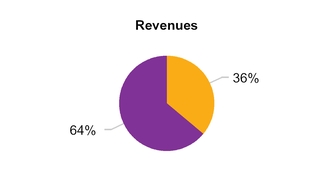

International 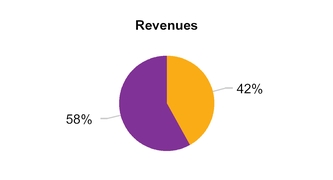
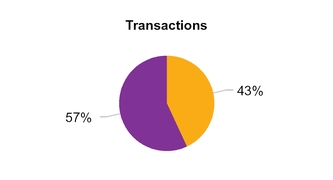
(Business/Leisure)
Customers who rent from it for “business” purposes include those who require vehicles in connection with commercial activities, including drivers for its TNC Partners, the activities of governments and other organizations or for temporary vehicle replacement purposes. Most business customers rent vehicles from it on terms that Hertz Global Holdings has negotiated with their employers or other entities with which they are associated, and those terms can differ substantially from the terms on which the company rent vehicles to the general public. Hertz Global Holdings has negotiated arrangements relating to vehicle rental with many businesses, governments and other organizations, including most Fortune 500 companies.
Customers who rent from it for “leisure” purposes include not only individual travelers booking vacation travel rentals with it but also people renting to meet other personal needs. Leisure rentals, generally, are longer in duration and generate more revenue per transaction than business rentals. Leisure rentals also include rentals by customers of U.S. and international tour operators, which are usually a part of tour packages that can include air travel and hotel accommodations.
VEHICLE RENTALS BY LOCATION Year Ended December 31, 2017
U.S. 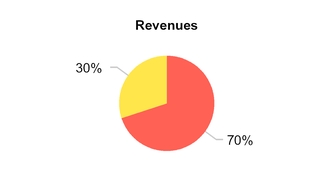
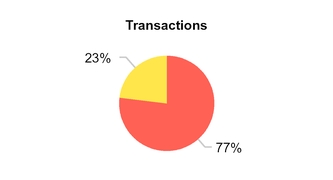
International 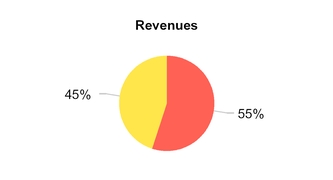

(Airport/Off airport)
Fleet
The company believe Hertz Global Holdings is one of the largest private sector purchasers of new vehicles in the world. During the year ended December 31, 2017, the company operated a peak rental fleet in the U.S. of approximately 504,300 vehicles and a peak rental fleet in its international operations of approximately 201,500 vehicles, and in each case exclusive of its franchisees' fleet and Donlen's leasing fleet. During the year ended December 31, 2017, its approximate average holding period for a rental vehicle was 17 months in the U.S. and 14 months in its international operations.
The company's fleet composition at December 31, 2017 is as follows Fleet Composition by Vehicle Manufacturer As of December 31, 2017

U.S. 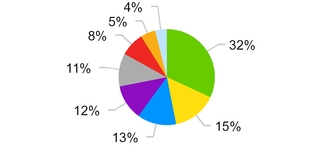
International 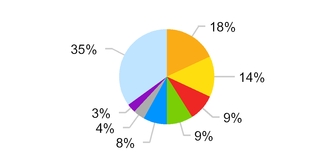
Purchases of vehicles are financed by active and ongoing global borrowing programs and through cash from operations. See Item 7, "Management's Discussion and Analysis of Financial Condition and Results of Operations—Liquidity and Capital Resources,” in this 2017 Annual Report.
The vehicles the company purchase are either program vehicles or non-program vehicles. The company periodically review the efficiencies of an optimal mix between program and non-program vehicles in its fleet and adjust the ratio of program and non-program vehicles in its fleet as needed based on contract negotiations and vehicle economics.
For program vehicles, under its repurchase programs, the manufacturers agree to repurchase vehicles at a specified price or guarantee the depreciation rate on the vehicles during established repurchase or auction periods, subject to, among other things, certain vehicle condition, mileage and holding period requirements. Repurchase prices under repurchase programs are based on the original cost less a set daily depreciation amount. Guaranteed depreciation programs guarantee on an aggregate basis the residual value of the vehicles covered by the programs upon sale according to certain parameters which include the holding period, mileage and condition of the vehicles. These repurchase and guaranteed depreciation programs limit its residual risk with respect to vehicles purchased under the programs and allow it to reduce the variability of depreciation expense for each vehicle, however, typically the acquisition cost is higher. Program vehicles generally provide it with flexibility to increase or reduce the size of its fleet based on economic demand. When the company increase the percentage of program vehicles, the average age of its fleet decreases since the average holding period for program vehicles is shorter than for non-program vehicles.
Program vehicles as a percentage of all vehicles purchased within each of its U.S. and International vehicle rental segments were as follows:
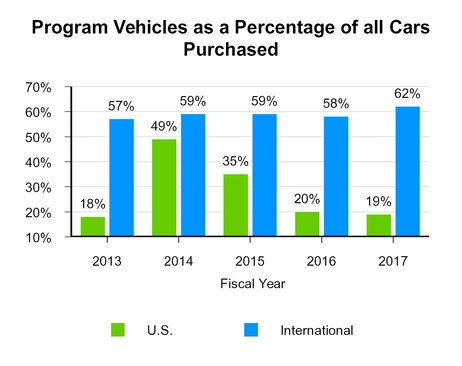
Non-program vehicles are not purchased under repurchase or guaranteed depreciation programs. Rather, the company dispose of non-program vehicles, as well as program vehicles that become ineligible for manufacturer repurchase or guaranteed depreciation programs, through a variety of disposition channels, including auctions, brokered sales, sales to wholesalers and sales to dealers. The company also dispose of vehicles at its own Hertz retail sales outlets, primarily in the U.S. which consists of a network of 80 company-operated vehicle sales locations dedicated to the sale of used vehicles from its rental fleet. Vehicles disposed of through its retail outlets allow it the opportunity for value-added service revenue, such as warranty and financing and title fees.
The company also offer Rent2Buy in 35 states and several European countries, an innovative program designed to sell used rental vehicles. Customers have an opportunity for a test rental of a vehicle from its rental fleet. If the customer purchases the vehicle, he or she is credited with a portion of their rental charges. The purchase transaction is completed through the internet and by mail in those states where permitted.
During the year ended December 31, 2017, of the vehicles sold in its U.S. vehicle rental operations that were not repurchased by manufacturers, the company sold approximately 32% at auction, 39% through dealer direct and 29% at retail locations or through its Rent2Buy program. During the year ended December 31, 2017, of the vehicles sold in its international vehicle rental operations that were not repurchased by manufacturers, the company sold approximately 15% at auction, 74% through dealer direct and 11% at retail locations or through its Rent2Buy program.
The company maintain automobile maintenance centers at or near certain airports and in certain urban and off airport areas, which provide maintenance for its vehicles. Many of these facilities include sophisticated vehicle diagnostic and repair equipment and are accepted by automobile manufacturers as eligible to perform and receive reimbursement for warranty work. Collision damage and major repairs are generally performed by independent contractors.
Franchisees
In certain U.S. and international markets, Hertz Global Holdings has found it efficient to utilize independent franchisees, which rent vehicles that they own, primarily under its Hertz, Dollar, or Thrifty brands. In certain markets and under certain circumstances, franchisees are given the opportunity to acquire franchises for multiple brands.
The company believe that its franchisee arrangements are important to its business because they enable it to offer expanded national and international service and a broader one-way rental program. Licenses are issued principally by its wholly-owned subsidiaries, under franchise arrangements to independent franchisees and affiliates who are engaged in the vehicle rental business in the U.S. and in many other countries.
Franchisees generally pay fees based on a percentage of their revenues. The operations of all franchisees, including the purchase and ownership of vehicles, are financed independently by the franchisees, and the company do not have any investment interest in the franchisees or their fleets. Fees from franchisees, including initial franchise fees, are used to, among other things, generally support the cost of its brand awareness programs, reservations system, sales and marketing efforts and certain other services and are less than 2% of its consolidated revenues each period. In return, franchisees are provided the use of the applicable brand name, certain operational support and training, reservations through its reservations channels, and other services. In addition to vehicle rental, certain franchisees outside the U.S. engage in vehicle leasing, chauffeur-driven rentals and renting camper vans and motorcycles.
U.S. franchisees ordinarily are limited as to transferability without its consent and are terminable by it only for cause or after a fixed term. Many of these agreements also include a right of first refusal on the part of the Company should a franchisee receive a bona fide offer to sell. Franchisees in the U.S. may generally terminate for any reason on 90 days' notice. In Europe and certain other international jurisdictions, franchisees typically do not have early termination rights. Initial license fees or the price for the sale to a franchisee of a company-owned location may be payable over a term of several years. The company continue to issue new licenses and, from time to time, purchase franchisee businesses.
Seasonality
The company's vehicle rental operations are a seasonal business, with decreased levels of business in the winter months and heightened activity during spring and summer peak ("our peak season") for the majority of countries where the company generate its revenues. To accommodate increased demand, the company increase its available fleet and staff during the second and third quarters of the year. As business demand declines, vehicles and staff are decreased accordingly. Certain operating expenses, including real estate taxes, rent, insurance, utilities, maintenance and other facility-related expenses, the costs of operating its information technology systems and minimum staffing costs, remain fixed and cannot be adjusted for seasonal demand.
The following chart sets forth this seasonal effect of its vehicle rental operations by presenting quarterly revenues for each of the years ended December 31, 2017, 2016 and 2015.
All Other Operations
Through its Donlen subsidiary, Hertz Global Holdings is a leading provider of comprehensive, integrated fleet leasing and fleet management solutions for corporate fleets. The company's All Other Operations segment generated $640 million in revenues during the year ended December 31, 2017, substantially all of which was attributable to Donlen.
Donlen
Donlen provides a comprehensive array of vehicle leasing, financing, telematics, and fleet management services to commercial fleets in the U.S. and Canada. Products offered by Donlen include:
- Vehicle financing, acquisition and remarketing;
- License, title and registration;
- Maintenance consultation;
- Fuel management;
- Accident management;
- oll management;
- Telematics-based location, driver performance and scorecard reporting; and
- Lease financing.
Donlen’s leased fleet consists primarily of passenger vehicles, cargo vans and light trucks. Vehicles are acquired directly from domestic and foreign manufacturers, as well as dealers. As of December 31, 2017, more than half of Donlen’s leased fleet is 2016 model year or newer.
Donlen’s primary product for vehicle and light to medium truck fleets is an open-ended terminal rental adjustment clause ("TRAC") lease. For most customers, the vehicle must be leased for a minimum of 12 months, after which the lease converts to a month-to-month lease allowing the vehicle to be surrendered any time thereafter. The company's sale of the vehicle following the termination of the lease may result in a TRAC adjustment, through which the customer is credited or charged with the surplus or loss on the vehicle. Approximately 80% of Donlen’s lease portfolio consists of floating-rate leases which allow lease charges to be adjusted based on benchmark indices.
Donlen offers financing solutions for heavier-duty trucks and equipment. Lease financing is provided through syndication arrangements with lending institutions. Donlen originates the leases, acquires the assets, and services the lease throughout the term.
Donlen provides services to leased and non-leased fleets consisting of fuel purchasing and management, preventive maintenance, repair consultation, toll management and accident management. Additionally, Donlen manages license and title, vehicle registration, and regulatory compliance. Donlen’s telematics products provide enhanced visibility and reporting over driver and vehicle performance.
The commercial fleet market is one of the largest segments of the U.S. automotive industry, primarily consisting of vehicles utilized in a sales, service, or delivery application. The fleet management industry has experienced significant consolidation over the years and today its principal fleet management competitors in the U.S. and Canada are Enterprise, Automotive Resources International, Element Financial Corporation, Wheels, Inc. and LeasePlan Corporation N.V.
EMPLOYEES
As of December 31, 2017, the company employed approximately 37,000 persons, consisting of approximately 28,000 persons in its U.S. operations and approximately 9,000 persons in its international operations. International employees are covered by a wide variety of union contracts and governmental regulations affecting, among other things, compensation, job retention rights and pensions. Labor contracts covering the terms of employment of approximately 25% of its workforce in the U.S. (including those in the U.S. territories) are presently in effect under active contracts with local unions, affiliated primarily with the International Brotherhood of Teamsters and the International Association of Machinists. Labor contracts covering almost 15% of these employees will expire during 2018. Hertz Global Holdings has had no material work stoppage as a result of labor problems during the last ten years, and the company believe its labor relations to be good. Nevertheless, the company may be unable to negotiate new labor contracts on terms advantageous to it, or without labor interruption.